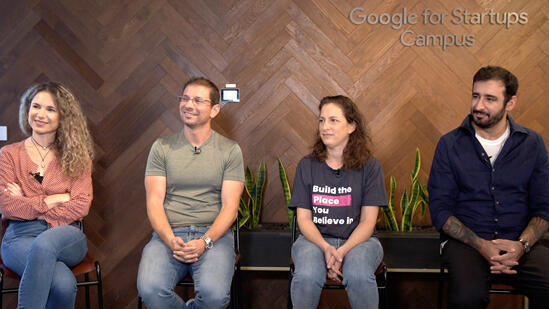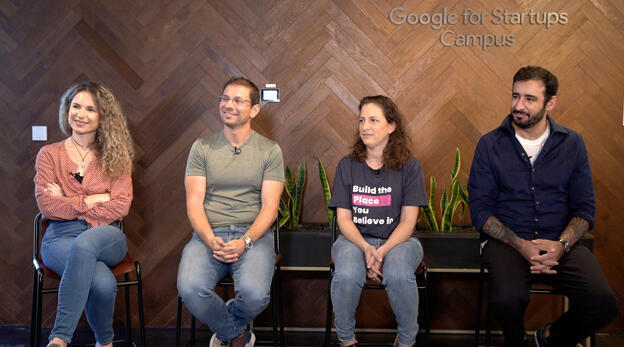
“Diversity is critical in startups”
A panel of experts spoke about hiring junior employees and improving diversity in Israeli high-tech during Calcalist and Google’s Startup Week
"We all know what the typical employee looks like in Israeli high-tech," said Keren Halperin-Musseri, CEO and Co-founder of Place-IL, during a panel at Calcalist and Google's Startup Week. "What's the problem? This stereotypical employee does excellent work - we don’t achieve our results by chance. However, the supply is limited. There is a limited number of secular Israelis from the center of the country who graduate from the IDF’s elite intelligence units." Other participants in the panel included Cohavit Almagor, Director of Engineering at Google, Amir Ofek, CEO of AxoniusX, and Guy Tytunovich, Founder and CEO of CHEQ.
Keren, could you tell us about Place-IL, how it started, and which issue it seeks to address in the high-tech industry?
"I co-founded this initiative a year and a half ago with Idan Tendler, who is a senior vice president at Palo Alto Networks. The initiative aims to solve the problem of supply and demand in the high-tech industry, specifically the labor force. In fact, even a year and a half ago, it was evident, as it is today, that the Israeli high-tech sector requires a large number of skilled workers. We are constantly searching for quality employees who meet industry standards and contribute to the growth of the Israeli economy. However, they are not always readily available.
Related articles:
“There is amazing talent among people who come from very different backgrounds - Arabs, ultra-Orthodox, Ethiopian immigrants, Israelis outside of the center of the country, and others who didn't serve in intelligence units, but the high-tech industry doesn't know how to integrate them. It doesn't know how to identify and recruit them. This is what Place-IL does - we find those candidates. There's no need to train them - they have already been educated in universities and colleges. We identify them and after screening, we offer them to companies as employees and before that, as interns, so that companies can assess if there is a true fit."
Amir, you are a satisfied customer of Place IL. How did you get connected and when did you realize that you needed more diversity among your employees?
"Keren and I knew each other from the intelligence corps in the army. When Keren had this idea, I was excited about it. In essence, as Keren explained, there is a lack of diversity in the high-tech industry today and in Israeli society. There are too many repeated patterns. People don't really understand each other. In startups, this diversity is very critical. It is very common in the United States - the issue of diversity and inclusion. While Israeli companies see its importance, when looking at startups at the beginning of their journey, it still hasn’t been incorporated.
"We at Axonius deal with innovation every day. It's basically what we do. In order to create an innovative environment that can come up with new products, you need to have a diverse workforce. Once, we tried to bring more women, and it wasn't easy. When Keren came up with the idea of Place IL, to hire underrepresented groups, we said, 'Let's try it.' A year and a half ago, we recruited two juniors, Ahmad and Hisham, and they integrated very quickly into the team. One of the things that pleasantly surprised us is that they came with training, because one of the initial hurdles you need to overcome with juniors, no matter the background, is to train them."
Cohavit, you at Google are also aware of the lack of diversity in the industry. As someone who advises startups, what is your approach when it comes to diversity and hiring employees from different backgrounds?
"Google is a sponsor of Place-IL and actively promotes this amazing initiative. Today, to lead development initiatives to fruition, there are numerous tasks. I believe that, in the end, when we want to establish a team, a group that will bring an initiative to execution, we need to incorporate people from different backgrounds. This leads to much better teamwork. Throughout my career, I've seen the hunger of junior employees to succeed. I see it today as well in projects within my group. When I leave the office, I see them still sitting there and programming. It's amazing. Additionally, I see the role of senior people in building a kind of career path for training and management, who, as experienced professionals, also want the chance to lead. In diverse teams, this symbiosis can be amazing."
Guy, you refrained from hiring junior employees at the beginning of your journey. What changed?
"First of all, we are all very privileged because we are Israelis. We have various assets that made us the startup nation, one of them being the military. I served in the army intelligence corps and received highly relevant training and experience.
"Alongside these privileges, both individually and collectively, the founder of a startup is privileged because it's not hard for us to support our households when starting our journey. It's a high starting point, but it's a very challenging journey. At the beginning, there's no money and no time. Reid Hoffman from LinkedIn called it 'building the plane while flying it.' You don't have the privilege to spend time on people without experience. That’s why I said that I don't expect startups to have the privilege of hiring junior employees, but today, CHEQ has many employees. We raised $200 million and will soon be a unicorn in terms of revenue. So we now have the privilege, and even the obligation, to invest time in juniors and contribute to the industry and the State of Israel."
